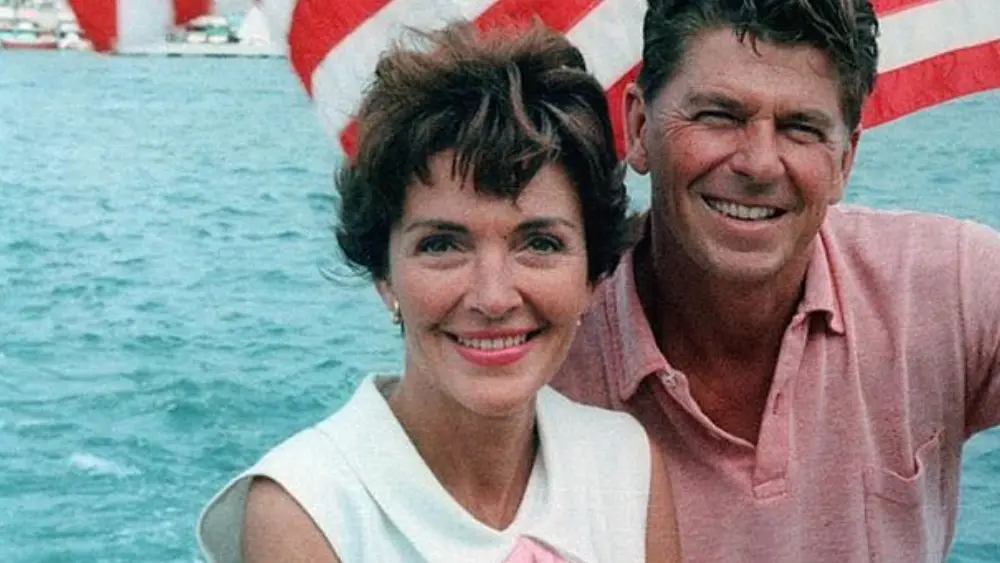Nancy Reagan, the elegant and influential First Lady of the United States from 1981 to 1989, played a pivotal role during her husband Ronald Reagan’s presidency. Born on July 6, 1921, in New York City as Anne Frances Robbins, she would become known for her grace, style, and advocacy. Nancy’s tenure as First Lady coincided with her husband’s “Reagan Revolution,” a transformative era in American politics and conservatism.
Early Life and Hollywood Career
Nancy Davis’s early life was marked by challenges that shaped her path to fame and public life. Nancy’s parents divorced, and she was adopted by her stepfather, becoming Nancy Davis when her mother married neurosurgeon Loyal Davis. Despite the turbulence of her early years, Nancy’s determination and aspirations propelled her into a successful acting career in Hollywood. It was within the glitz and glamour of the entertainment industry that she would cross paths with her future husband, Ronald Reagan, setting the stage for a love story that would ultimately intertwine with the corridors of political power.
Nancy Davis’s Hollywood career not only brought her recognition but also paved the way for a transformative chapter in her life as the First Lady of the United States. Her early years, marked by personal challenges, laid the foundation for the remarkable journey that would see her as a prominent figure on both the silver screen and the political stage, standing alongside her husband as they embarked on a journey that would shape the nation’s history.
Nancy Reagan: Marriage to Ronald Reagan
The year 1952 marked a significant turning point in Nancy Reagan’s life as she entered into a marriage that would define her personal and political legacy. Her union with Ronald Reagan not only symbolized the start of a profound partnership but also marked the beginning of a remarkable chapter in American history. As a couple, they navigated the challenges and celebrated the successes of life together, forging a deep and enduring bond that would become the cornerstone of their remarkable political journey.
Nancy and Ronald Reagan’s marriage was not just a partnership; it was a formidable force in American politics. Their unwavering support for each other, both in public and behind closed doors, served as a source of strength as they ascended to the highest echelons of power.
First Lady of California
Ronald Reagan’s election as Governor of California in 1966 opened a new chapter in Nancy Reagan’s life and provided her with a prominent platform to engage in meaningful projects. During her tenure as the First Lady of California, she dedicated herself to several important causes, foreshadowing her later work on the national stage. One of her key priorities was advocating for Veterans, demonstrating her deep commitment to those who had served their country. Additionally, Nancy took a proactive role in promoting drug prevention programs, recognizing the importance of addressing substance abuse issues early on. These early initiatives reflected her passion for social causes and her desire to make a positive impact on society, setting the stage for her influential role as the First Lady of the United States.
Nancy Reagan’s time as the First Lady of California was a formative period in her life where she honed her skills as an advocate and champion for important social issues. Her work in support of Veterans and her commitment to drug prevention programs served as a preview of the impactful role she would play as First Lady of the United States, where she continued to focus on these and other vital causes, leaving an enduring legacy of advocacy and social responsibility.
Nancy Reagan: The “Reagan Revolution” Begins
The election of Ronald Reagan as President of the United States in 1980 heralded the beginning of a transformative era in American politics, often referred to as the “Reagan Revolution.” At the forefront of this monumental shift was Nancy Reagan, who stood unwaveringly by her husband’s side, playing a pivotal role in advancing his agenda. Together, they embarked on a mission to reshape the nation’s political and economic landscape. Nancy was a formidable advocate for her husband’s policies, including sweeping economic reforms, tax cuts, and a significant increase in military spending, all aimed at bolstering America’s position in the world and revitalizing the nation’s economy.
Nancy Reagan’s influence and active involvement in her husband’s presidency went beyond her role as First Lady. She was a trusted advisor and confidante to President Reagan, shaping policy decisions and providing unwavering support. Her dedication to the causes they championed and her ability to rally public support was instrumental in the success of the Reagan administration’s transformative agenda. Together, they made a lasting impact on the nation’s history, demonstrating the strength and resilience of their partnership in politics and beyond.
The “Just Say No” Campaign
Nancy Reagan’s tenure as First Lady is perhaps best remembered for her iconic ‘Just Say No’ campaign—an initiative that significantly shaped the nation’s approach to combating drug abuse, especially among young people. Her passionate and unwavering advocacy brought national attention to this pressing issue, making her a prominent figure in the fight against drug addiction during the 1980s. Through this campaign, Nancy encouraged young Americans to reject the allure of drugs and to make informed, responsible choices. Her message was simple yet powerful, resonating with millions and inspiring a generation to resist the destructive influence of drugs.
The “Just Say No” campaign represented Nancy Reagan’s dedication to using her position and influence to address critical social issues. It became a rallying cry for communities, schools, and families across the country, fostering a dialogue about the devastating impact of drug abuse and the importance of prevention. Nancy’s commitment to this cause showcased her ability to leverage her role as First Lady to initiate meaningful change, leaving an enduring legacy as a passionate advocate for a healthier and drug-free America.
Nancy Reagan: Behind the Scenes and Public Image
Nancy Reagan’s public image as First Lady projected an aura of grace and elegance, but behind the scenes, she played a pivotal role as a fiercely protective and influential advisor to her husband, President Ronald Reagan. Her impact on his presidency extended well beyond the confines of a traditional First Lady’s role. Nancy’s advice and insights were highly valued by the President, and she wielded considerable influence in shaping his policies and decision-making process. Her behind-the-scenes role as a trusted confidante and political strategist showcased her shrewd understanding of the political landscape and her dedication to advancing the Reagan administration’s agenda.
Nancy Reagan’s dual identity, as both a symbol of style and sophistication in the public eye and a powerful force behind the scenes, demonstrated her remarkable ability to navigate the complex world of American politics. Her contributions to her husband’s presidency and the nation as a whole were substantial, underscoring the significant role that First Ladies can play in shaping the course of history. Her legacy is a testament to her unwavering commitment to her husband and the nation, and her impact continues to be felt in the annals of American politics and diplomacy.
The Reagan Legacy
The “Reagan Revolution” marked a transformative era in American politics, and Nancy Reagan’s pivotal role in supporting and influencing her husband’s presidency was instrumental in its success. Ronald Reagan’s ascent to the presidency was not only marked by his popularity but also by the unwavering partnership he shared with Nancy. Together, they championed conservative principles that reshaped the nation’s political landscape. Their collaboration left a profound and lasting legacy that extended far beyond their time in the White House, as the Reagan administration’s policies and ideas continue to shape American conservatism to this day.
The Reagan legacy is a testament to the enduring impact of their shared vision for America. Their leadership, rooted in conservative principles of limited government, economic freedom, and a strong national defense, has had a lasting impact on the Republican Party and the broader conservative movement. The Reagan era remains a touchstone for those who seek to advance conservative ideals in the United States, with both Ronald and Nancy Reagan remembered as influential figures who helped shape the course of American political history.

Nancy Reagan: Later Years and Philanthropy
In the later years of her life, after Ronald Reagan’s presidency, Nancy Reagan remained steadfast in her commitment to public service, even in the face of her husband’s battle with Alzheimer’s disease. Her dedication to advocacy took on a deeply personal dimension as she became a prominent figure in the fight against Alzheimer’s, raising awareness and funds for research into this devastating illness. Nancy’s tireless efforts to shine a spotlight on Alzheimer’s not only helped destigmatize the disease but also inspired a renewed focus on finding a cure and improving care for those affected by it. Her unwavering commitment to this cause, borne out of love and compassion, left an enduring mark on the field of Alzheimer’s research and caregiving.
Nancy Reagan’s philanthropic endeavors in her later years were a testament to her resilience and her unwavering dedication to making a positive impact on society. Her advocacy for Alzheimer’s research and awareness, fueled by her personal experience as a caregiver, showcased the power of empathy and determination in the face of a challenging and deeply personal journey. Nancy’s legacy continues to inspire efforts in the fight against Alzheimer’s, improving the lives of those affected by it and leaving a lasting impact on philanthropy and healthcare advocacy.










